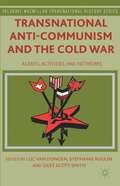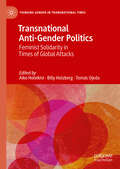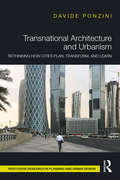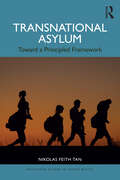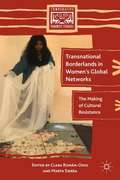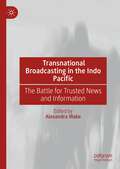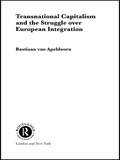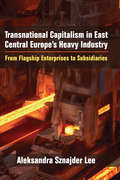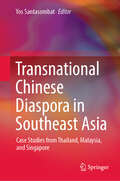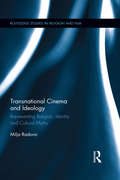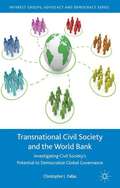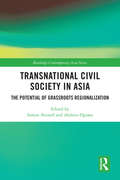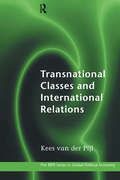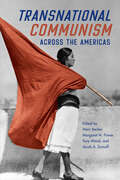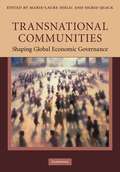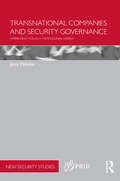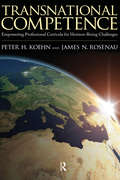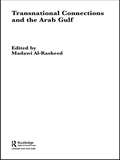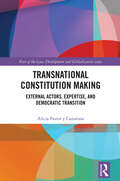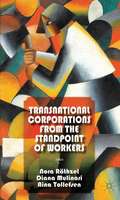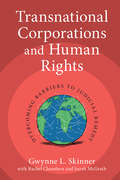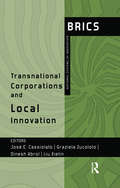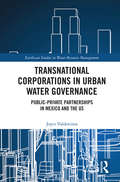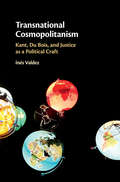- Table View
- List View
Transnational Anti-Communism and the Cold War
by Giles Scott-Smith Luc Van Dongen St�phanie RoulinHow was anti-communism organised in the West? This book covers the agents, aims, and arguments of various transnational anti-communist activists during the Cold War. Existing narratives often place the United States - and especially the CIA - at the centre of anti-communist activity. The book instead opens up new fields of research transnationally.
Transnational Anti-Gender Politics: Feminist Solidarity in Times of Global Attacks (Thinking Gender in Transnational Times)
by Aiko Holvikivi Billy Holzberg Tomás OjedaIn recent years, attacks on the rise of ‘gender ideology’ and ‘genderism’ as a political force, on gender studies as an academic field, and on feminist, queer and trans individuals seen to be their embodied representatives, have grown in scope and intensity. This edited volume understands such attacks as a global force in need of urgent analytical and political attention. Drawing on contributions from and about a varied range of geographical locations including Argentina, Chile, China, Germany, the Persian Gulf, Hungary, India, Pakistan, Peru, South Africa, Spain, Turkey, Uganda, the UK and the US, this book explores how anti-gender mobilisations work as a transnational formation shaped by the legacies of colonialism, racial capitalism, and resurgent nationalisms and how these can be resisted. By transnationalising our inquiries into the epistemic, affective and political nature of the anti-gender phenomenon, this volume troubles the ‘origin stories’ we tell about where anti-genderpolitics come from, and helps to better locate the various sources, actors, and networks behind these attacks, contesting the notion that anti-gender politics derive solely from right-wing nationalist or conservative religious actors, to show how they also derive from more centrist, liberal, leftist and even presumably feminist positions. The book thus invites us to sharpen and rethink the conceptual vocabularies and strategies we use to understand and resist anti-gender attacks, opening up space for envisioning new political imaginaries and transnational feminist solidarities.Chapter 1 is available open access under a Creative Commons Attribution 4.0 International License via link.springer.com.
Transnational Architecture and Urbanism: Rethinking How Cities Plan, Transform, and Learn
by Davide PonziniTransnational Architecture and Urbanism combines urban planning, design, policy, and geography studies to offer place-based and project-oriented insight into relevant case studies of urban transformation in Europe, North America, Asia, and the Middle East. Since the 1990s, increasingly multinational modes of design have arisen, especially concerning prominent buildings and places. Traditional planning and design disciplines have proven to have limited comprehension of, and little grip on, such transformations. Public and scholarly discussions argue that these projects and transformations derive from socioeconomic, political, cultural trends or conditions of globalization. The author suggests that general urban theories are relevant as background, but of limited efficacy when dealing with such context-bound projects and policies. This book critically investigates emerging problematic issues such as the spectacularization of the urban environment, the decontextualization of design practice, and the global circulation of plans and projects. The book portends new conceptualizations, evidence-based explanations, and practical understanding for architects, planners, and policy makers to critically learn from practice, to cope with these transnational issues, and to put better planning in place.
Transnational Asylum: Toward a Principled Framework (Routledge Studies in Human Rights)
by Nikolas Feith TanThis book presents an original framework of transnational asylum to inform future cooperation between states on asylum processing and refugee protection.The book provides scholarly guidance on how policies can be undertaken in a way that conforms with the rights of asylum seekers and refugees under international law, asking if transnational asylum offers a workable model for lawful international cooperation and responsibility-sharing. It engages with the practical and legal modalities needed to ensure respect for binding obligations in the context of the current trend of rejection of territorial asylum among some states. The book puts forward a blueprint for how existing policies of deterrence and externalisation can be retooled to share, rather than shift, responsibility for refugees.This book will be of key interest to scholars, students, policymakers and practitioners interested and working in Human Rights, International Refugee Law and Refugee Studies.
Transnational Borderlands in Women’s Global Networks
by Clara Román-Odio Marta SierraTransnational Borderlands: The Making of Cultural Resistance in Women's Global Networks investigates the implications of transnational feminist methodologies at multiple levels: collective actions, theory, pedagogy, discursive, and visual productions. It addresses a substantial gap in the field of transnational feminisms; namely, the absence of a voice that links social and theoretical outcomes to the politics of representation in literature, visual art, discourses of rights and citizenships, and pedagogy. The book encompasses three categories of relevance to contemporary transnational methodologies: the politics of cultural representation in literature and visual art, the de-centering of human/women's rights, and pedagogies of crossing and dissent. Given current interest in the cultures of globalization and the role women and other minorities play in them, we expect this book will appeal to scholars in the fields of Women's and Gender Studies, Borderlands Studies, Transnational Studies, and to anyone interested in how transnational processes shape a culture of resistance in women's global networks.
Transnational Broadcasting in the Indo Pacific: The Battle for Trusted News and Information
by Alexandra WakeTransnational Broadcasting in the Indo-Pacific brings together research spanning journalism, broadcast and political science to interrogate the issues arising from a rapidly changing global political and broadcast environment. This book asks: Why is there increasing interest in the provision of English-language media in the Indo-Pacific from countries like China? What are the implications for the traditional providers of foreign-produced news such as the Australia Broadcasting Corporation and the British Broadcasting Corporation? What now is the role of social media in the creation of broadcast journalism, and why is there panic in diplomatic circles about some of the journalism that originates from broadcasters in China and Russia? The result is a book that offers an insight into a rapidly transforming media landscape, the changing state of international relations, and the rise of new powers.
Transnational Capital and Class Fractions: The Amsterdam School Perspective Reconsidered (RIPE Series in Global Political Economy)
by Bob Jessop Henk OverbeekEmerging in the late 1970s, the Amsterdam School’s (AS) most distinctive contribution to international political economy was the systematic incorporation of the Marxian concept of capital fractions into the study of international politics. Contending that politics in advanced capitalist countries takes place in a fundamentally transnationalized space in which the distinction between ‘domestic’ and ‘international’ has blurred, it shows how in this space, politics is structured by competing comprehensive concepts of control. Presenting a concise and instructive introduction to the origins, development and significance of this distinct approach, this book provides a unique overview of the School’s contemporary significance for the field. Offering a new generation of critical scholars the opportunity to become acquainted at first hand with some of the contributions that have shaped the work of the AS, the contributions present critical commentaries, discussing the merits and shortcomings of the AS from a variety of perspectives, and undertake a (self-) critical evaluation of the current place and value of the AS framework in the broader landscape of approaches to the study of contemporary capitalism. Written for scholars and students alike, it will be of interest to those working in international political economy, international relations and political science, political sociology, European studies and branches of academic economics such as regulation theory and institutional economics.
Transnational Capitalism and the Struggle over European Integration (RIPE Series in Global Political Economy #Vol. 6)
by Bastiaan van ApeldoornThis book presents an analysis of the transnational social forces in the making of a new European socio-economic order that emerged out of the European integration process during the 1980s and 1990s. Arguing that the political economy of European integration must be put within the context of a changing global capitalism, Van Apeldoorn examines how European change is linked to global change and how transnational actors mediate these changes.
Transnational Capitalism in East Central Europe's Heavy Industry: From Flagship Enterprises to Subsidiaries
by Aleksandra Sznajder LeeFocusing on the steel industry during the post-communist transition from 1989 through 2009, Aleksandra Sznajder Lee traces the transformation of flagship state enterprises in the Czech Republic, Poland, Romania, and Slovakia into the subsidiaries of large, international corporations. By analyzing this transformation at the three levels of enterprise, sector, and national-international nexus, she identifies the players--from international investors and European Union members to national labor unions and local industry managers--in the political economy of reform. Even in the midst of the transition to a capitalist, democratic system, Sznajder Lee finds, the state plays a key role in mediating between domestic vested interests and external pressures from international financial markets and institutions, on the one hand, and regional institutions on the other. Whereas state power may be employed to require domestic firms to operate as capitalists in the international market, it may also be used to shield enterprises from market pressures in order to promote the political and personal preferences of the elite. This book has broad implications for the political economy of reform because it illuminates the political determinants of privatization and the resources used to resist it. In addition, Sznajder Lee sheds new light on why some countries are more likely than others to be subject to external constraints, such as IMF conditionality, and how some allegedly pro-market reformers manage to maintain public ownership over certain industry sectors.
Transnational Chinese Diaspora in Southeast Asia: Case Studies from Thailand, Malaysia, and Singapore
by Yos SantasombatThis book examines contemporary Chinese transnational mobile practices with special focuses on the ethnographic exploration of the lives, experiences, views, and narratives of the Chinese mobile subjects in three ASEAN countries: Malaysia, Singapore and Thailand, and their interactions with the ethnic Chinese communities in these countries. This book is based on recent and updated original ethnographic research carried out by leading scholars in China and Southeast Asia. The work addresses questions of integration and social embeddedness, interrogating the possibility of whether the transnational Chinese diaspora can be simultaneously embedded into two or more nation-states and geopolitical spheres. It contends that in moving in the transnational space, the Chinese diaspora may experience a strong yearning for a cultural home that may not be in one space for bicultural or multicultural diaspora. It also asks whether the transnational Chinese diaspora is motivated to negotiate cultural membership and social belonging in a new country. Shedding new light on the ways in which the transnational diaspora negotiates cultural membership to adapt to situational requirements, this volume is relevant to scholars researching in China studies, anthropology, international relations, and in Asian, Southeast and East Asian regional studies.
Transnational Cinema and Ideology: Representing Religion, Identity and Cultural Myths (Routledge Studies in Religion and Film)
by Milja RadovicIncreasingly, as the production, distribution and audience of films cross national boundaries, film scholars have begun to think in terms of ‘transnational’ rather than national cinema. This book is positioned within the emerging field of transnational cinema, and offers a groundbreaking study of the relationship between transnational cinema and ideology. The book focuses in particular on the complex ways in which religion, identity and cultural myths interact in specific cinematic representations of ideology. Author Milja Radovic approaches the selected films as national, regional products, and then moves on to comparative analysis and discussion of their transnational aspects. This book also addresses the question of whether transnationalism reinforces the nation or not; one of the possible answers to this question may be given through the exploration of the cinema of national states and its transnational aspects. Radovic illustrates the ways in which these issues, represented and framed by films, are transmitted beyond their nation-state borders and local ideologies in which they originated – and questions whether therefore one can have an understanding of transnational cinema as a platform for political dialogue.
Transnational Civil Society and the World Bank
by Christopher L. PallasTransnational civil society is often seen as an important contributor to the democratization of global governance. In their engagement with the World Bank, however, transnational civil society organizations prioritize pre-existing mission over responsiveness to claimed stakeholders and undercut the authority of developing country governments.
Transnational Civil Society in Asia: The Potential of Grassroots Regionalization (Routledge Contemporary Asia Series)
by Simon Avenell and Akihiro OgawaThis edited volume addresses how transnational interactions among civil society actors in Asia and its sub-regions are helping to strengthen common democratic values and transform dominant processes of policymaking and corporate capitalism in the region. The contributors conceive of transnational civil society networks as constructive vehicles for both informing and persuading governments and businesses to adopt, modify, or abandon certain policies or positions. This volume investigates the role of such networks through a range of interdisciplinary approaches, bringing together case studies on Asian transnationalism from South, Southeast, and Northeast Asia across four key themes: local transformations and connections, diaspora politics, cross-regional initiatives and networks, and global actors and influences. Chapters demonstrate how transnational civil society is connecting people in local communities across Asia, in parallel to ongoing tensions between nation-states and civil society. By highlighting the grassroots regionalization emerging from ever-intensifying information exchange between civil society actors across borders – as well as concrete transnational initiatives uniting actors across Asia – the volume advances the intellectual mandate of redefining ‘Asia’ as a dynamic and interconnected formation. Transnational Civil Society in Asia will appeal to students and scholars of international relations, politics and Asian studies more broadly.
Transnational Classes and International Relations (RIPE Series in Global Political Economy)
by Kees Van der PijlAn exciting and original analysis of the development of capitalist classes, such as the Freemasons, that cross national boundaries in the global political economy. This innovative book focuses on:* an historical perspective on class formation under capitalism and its transnational integration* international relations between the English-speaking centre of capital and successive contender states. The author develops a broad-ranging and thorough understanding of class in the process of globalization. He does so within several theoretical frameworks shedding much light on this important topic.
Transnational Communism across the Americas
by Tanya Harmer Marc Becker Tony Wood Margaret Power Jacob Blanc Jacob A. Zumoff Victor Jeifets Adriana Petra Patricia Harms Lazar Jeifets Frances Peace Sullivan Kevin A YoungTransnational Communism across the Americas offers an innovative approach to the study of Latin American communism. It convincingly illustrates that communist parties were both deeply rooted in their own local realities and maintained significant relationships with other communists across the region and around the world. The essays in this collection use a transnational lens to examine the relationships of the region’s communist parties with each other, their international counterparts, and non-communist groups dedicated to anti-imperialism, women’s rights, and other causes. Topics include the shifting relationship between Mexican communists and the Comintern, Black migrant workers in the Caribbean, race relations in Cuba, Latin American communists in the USSR, Luís Carlos Prestes in Brazil, the U.S. and Puerto Rican communist and Nationalist parties, peace activist networks in Latin America, communist women in Guatemala, transnational student groups, and guerrillas in El Salvador. Contributors: Marc Becker, Jacob Blanc, Tanya Harmer, Patricia Harms, Lazar Jeifets, Victor Jeifets, Adriana Petra, Margaret M. Power, Frances Peace Sullivan, Tony Wood, Kevin A. Young, and Jacob Zumoff
Transnational Communities: Shaping Global Economic Governance
by Marie-Laure Djelic Sigrid QuackTransnational communities are social groups that emerge from mutual interaction across national boundaries, oriented around a common project or 'imagined' identity. This common project or identity is constructed and sustained through the active engagement and involvement of at least some of its members. Such communities can overlap in different ways with formal organizations but, in principle, they do not need formal organization to be sustained. This book explores the role of transnational communities in relation to the governance of business and economic activity. It does so by focusing on a wide range of empirical terrains, including discussions of the Laleli market in Istanbul, the institutionalization of private equity in Japan, the transnational movement for open content licenses, and the mobilization around environmental certification. These studies show that transnational communities can align the cognitive and normative orientations of their members over time and thereby influence emergent transnational governance arrangements.
Transnational Companies and Security Governance: Hybrid Practices in a Postcolonial World (PRIO New Security Studies)
by Jana HönkeThis book investigates governance practiced by non-state actors. It analyses how multinational mining companies protect their sites in fragile contexts and what that tells us about political ordering 'beyond' the state. Based on extensive primary research in the Democratic Republic of Congo, South Africa, Europe and North America, the book compares companies' political role in the 19th and 21st centuries. It demonstrates that despite a number of disturbing parallels, many contemporary practices are not a reversion to the past but unique to the present. The book discloses hybrid security practices with highly ambiguous effects around the sites of contemporary companies that have committed to norms of corporate social and security responsibility. Companies invest in local communities, and offer human rights training to security forces alongside coercive techniques of fortress protection, and stability-oriented clientele practice and arrangements of indirect rule. The book traces this hybridity back to contradictory collective meaning systems that cross borders and structure the perceptions and choices of company managers, private security officers, NGO collaborators and others practitioners. The book argues that hybrid security practices are not the result of an encounter between a supposed ‘local’ with the liberal ‘global’. Instead, this hybridity is inherent in the transnational and part and parcel of liberal transnational governance. Therefore, more critical reflection of global governance in practice is required. These issues are sharply pertinent to liberal peacebuilding as well as global governance more broadly. The book will be of interest to anyone interested in business, politics and human rights; critical security studies; peacebuilding and statebuilding; African politics; and ethnographic and sociological approaches to global governance and international relations more generally.
Transnational Competence: Empowering Curriculums for Horizon-rising Challenges
by Peter H. Koehn James N. RosenauIn this timely new contribution, Koehn and Rosenau develop their transnational-competence framework and demonstrate the promise of its application across six critical professions: teacher education, engineering, business management, social work, sustainable-development (encompassing agricultural sciences, public administration, and natural-resources management), and medicine/health. Transnational Competence offers higher-education leaders around the world useful ideas for enhancing and transforming professional programs so that graduating practitioners will be prepared with the skills needed to manage horizon-rising challenges that connect populations, ecosystems, and fields of study. Aimed principally at higher-education leaders and graduating professionals throughout the world, Transnational Competence focuses on the skills that tomorrow's practitioners will need to deal with what the authors term horizon-rising transboundary challenges.
Transnational Connections and the Arab Gulf (Routledge Research in Transnationalism #Vol. 16)
by Madawi Al-RasheedTransnational Connections and the Arab Gulf presents a study of transnational cultural flows in the Gulf region and beyond. It combines an understanding of the region's historical connections with the outside world and an assessment of contemporary consequences of these connections.The contributors collected here analyze and map historical and contemporary manifestations of transnational networks within this region, linking them to wider debates on society, identity and political culture.
Transnational Constitution Making: External Actors, Expertise, and Democratic Transition (Law, Development and Globalization)
by Alicia Pastor y CamarasaThis book examines the largely neglected but crucial role of transnational actors in democratic constitution-making.The writing or rewriting of constitutions is usually a key moment in democratic transitions. But how exactly does this take place? Most contemporary comparative constitutional literature draws on the concept of constituent power – the power of the people – to address this moment. But what this overlooks, this book argues, is the important role of external, transnational actors who tend to play a crucial role in the process. Drawing on sociolegal methodologies but informed by new legal realism, this book develops a new theoretical framework for examining the involvement of such actors in constitution-making. Empirically grounded, the book uncovers a more comprehensive picture of how constitution-making unfolds on the ground. Illuminating the power dynamics at play during the legal process, it reveals not only the wide range of external actors involved but also the continuity between decolonisation and post-Cold War constitution-making. This book, the first to provide an in-depth examination of external actor involvement in constitution-making, will appeal to scholars of constitutional law, sociolegal studies, law and development, and transitional justice.
Transnational Corporations From The Standpoint Of Workers
by Nora Räthzel Diana Mulinari Aina TollefsenThis book explores the history and global expansion of AB Volvo, one of the hundred largest corporations in the world, through the experiences of its workers in Sweden, Mexico, South Africa, and India. It investigates how neo-liberalisation has transformed the company into a promoter of lean production, at the expense of the workers' needs.
Transnational Corporations and Human Rights: Overcoming Barriers to Judicial Remedy
by Gwynne L. SkinnerThe number of transnational corporations—including parent companies and subsidiaries—has exploded over the last forty years, which has led to a correlating rise of corporate violations of international human rights and environmental laws, either directly or in conjunction with government security forces, local police, state-run businesses, or other businesses. In this work, Gwynne Skinner details the harms of business-related human rights violations on local communities and describes the barriers, both functional and institutional, that victims face in seeking remedies. She concludes by offering solutions to these barriers, with a focus on measures designed to improve judicial remedies, which are the heart of international human rights law but often fail to deliver justice to victims. This work should be read by anyone concerned with the role of corporations in our increasingly globalized society.
Transnational Corporations and Local Innovation: BRICS National Systems of Innovation
by José E. Cassiolato; Graziela Zucoloto; Dinesh Abrol; Liu XielinThis series of books brings together results of an intensive research programme on aspects of the national systems of innovation (NSI) in the five BRICS countries — Brazil, Russia, India, China, and South Africa. It provides a comprehensive and comparative examination of the challenges and opportunities faced by these dynamic and emerging economies. In discussing the impact of innovation with respect to economic, geopolitical, socio-cultural, institutional, and technological systems, it reveals the possibilities of new development paradigms for equitable and sustainable growth.This volume explores the relationship between transnational corporations (TNCs) and NSI across BRICS economies. The essays highlight the role of foreign direct investment (FDI), the evolution of TNCs and examine local factors — such as government policies, human resources, market structures, and technological capabilities — that affect collaborative efforts with indigenous firms towards innovation and development. The authors approach the thesis of technological globalisation with some caution, refuting the idea that research and development (R&D) activities have been inexorably internationalised. Original and detailed data, together with expert analyses on wide-ranging issues, make this book an invaluable resource for researchers and scholars in economics, development studies and political science, in addition to policy makers and development practitioners interested in the BRICS countries.
Transnational Corporations in Urban Water Governance: Public-Private Partnerships in Mexico and the US (Earthscan Studies in Water Resource Management)
by Joyce ValdovinosThis book examines the role played by business in urban water governance by analyzing the evolution of the global private water sector along with four public-private partnerships in Mexico and the U.S. The local nature of water services often hides the global developments behind the rise of transnational water corporations, which have gone from being local operators to becoming dynamic and powerful actors within an interconnected transnational space for water. This book focuses on the French groups Veolia and Suez, two of the most prominent private actors in global water governance, and the development and adaptation strategies of both companies in the cities of Aguascalientes, Mexico City, Atlanta, and Milwaukee over the past 30 years. Drawing on over 100 interviews conducted with corporate executives, public authorities, and local users of water services, this book moves beyond the simplistic dichotomy of the public-private debate and develops a theoretical framework that analyzes the economic and political power wielded by transnational business actors in global water governance. Not only does the book explain how Veolia and Suez strategically mobilize resources at difference scales in order to expand their global operations, but it also provides a nuanced picture of how state regulation remains of central importance to understanding the dynamics and evolution of the global water sector. Students and scholars interested in business and the environment, including public-private partnerships, business management and transnational corporations, and water governance, will find this book of great interest as will professionals and policymakers working in these fields.
Transnational Cosmopolitanism: Kant, Du Bois, and Justice as a Political Craft
by Inés ValdezBased on the theoretical reconstruction of neglected post-WWI writings and political action of W. E. B. Du Bois, this volume offers a normative account of transnational cosmopolitanism. Pointing out the limitations of Kant's cosmopolitanism through a novel contextual account of Perpetual Peace, Transnational Cosmopolitanism shows how these limits remain in neo-Kantian scholarship. Inés Valdez's framework overcomes these limitations in a methodologically unique way, taking Du Bois's writings and his coalitional political action both as text that should inform our theorization and normative insights. The cosmopolitanism proposed in this work is an original contribution that questions the contemporary currency of Kant's canonical approach and enlists overlooked resources to radicalize, democratize, and transnationalize cosmopolitanism.
